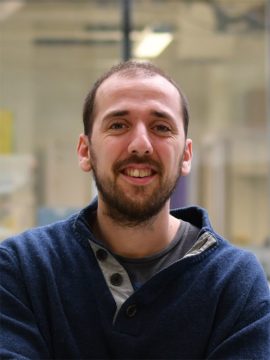Videoconference
">Contact Filipe Nunes Vicente to get the link
Studying mechanosensing at the molecular level by combining cell stretching and super-resolution microscopy: the case of integrin adhesions and the cytoskeleton
 Filipe Nunes Vicente
Filipe Nunes Vicente
Team Giannone
IINS
Thesis supervisor: Gregory Giannone
Abstract
Detection and conversion of mechanical forces into biochemical signals is known as mechanotransduction. From cells to tissues, mechanotransduction events regulate migration, proliferation and differentiation in physiological and pathological processes such as immune response, development and metastasis. Integrin adhesion sites (IAS) are mechanosensitive complexes structures essential for many of these processes, regulating cell adhesion, intracellular signaling and force transmission. Mechanosensing is based on protein deformations and reorganizations in response to force. However, the molecular mechanisms of mechanosensing in live cells remain poorly understood. Using a cell stretching device compatible with super-resolution microscopy (SRM) and single protein tracking (SPT), we explored the nanoscale deformations and reorganizations of individual proteins inside mechano-sensitive structures. We achieved SRM after live stretching on intermediate filaments, microtubules and integrin adhesion sites. Simultaneous SPT and stretching showed that while integrins follow the elastic deformation of the substrate, actin filaments and talin also displayed lagged and transient inelastic responses associated with active actomyosin remodeling and talin deformations. Capturing acute reorganizations of single-molecule during stretching showed that force-dependent vinculin recruitment is delayed and depends on the maturation state of integrin adhesions. Thus, cells respond to external forces by amplifying transiently and locally cytoskeleton displacements enabling protein deformation and recruitment in mechano-sensitive structures. We then adapted our strategy to decipher the molecular mechanisms of mechanosensing in neurons. In the nervous system, mechanotransduction regulates pain sensation, axonal guidance, proprioception, and brain trauma. The membrane periodic skeleton (MPS), a subcortical periodic actin-spectrin lattice, could have potential mechanosensitive roles in axons and dendrites. We modified our cell stretching device to enable long-term neuronal culture and stretching of neurons combined with SRM/SPT imaging of MPS proteins.
Keywords: Mechanosensing, integrin adhesion sites (IAS), cytoskeleton, cell stretching, super resolution microscopy, single particle tracking.
Publications
- Massou, S.*, Vicente, F. *, Wetzel, F*. et al. Cell stretching is amplified by active actin remodelling to deform and recruit proteins in mechanosensitive structures. Nat Cell Biol 22, 1011–1023 (2020). https://doi.org/10.1038/s41556-020-0548-2
(* These authors contributed equally)
- Vicente, F. N. et al. A micromechanical stretching device compatible with super-resolution microscopy. Exch., (2020). https://doi.org/10.21203/rs.3.pex-961/v1
- Radhakrishnan, A. V., Chen, T., Vicente, F.N., Orré, T., Mehidi, A., Rossier, O., & Giannone, G. Single-Protein Tracking to Study Protein Interactions during integrin-based migration. Methods in Molecular Biology 2217 (in press).
Jury
- MONTCOUQUIOL, Mireille – Directeur de recherche (INSERM), NCM – Présidente
- GRASHOFF, Carsten – Professeur, IMCB, University of Münster – Rapporteur
- THÉRY, Manuel – Directeur de recherche (CEA), IHU – Rapporteur
- Mme. LÉVÊQUE-FORT, Sandrine – Directeur de recherche (CNRS), ISMO – Examinatrice
- LETERRIER, Christophe – Chargé de recherche (CNRS), INP – Examinateur
- NASSOY, Pierre – Directeur de recherche (CNRS), LP2N – Invité
- GIANNONE, Grégory – Directeur de recherche (CNRS), IINS – Directeur de thèse

